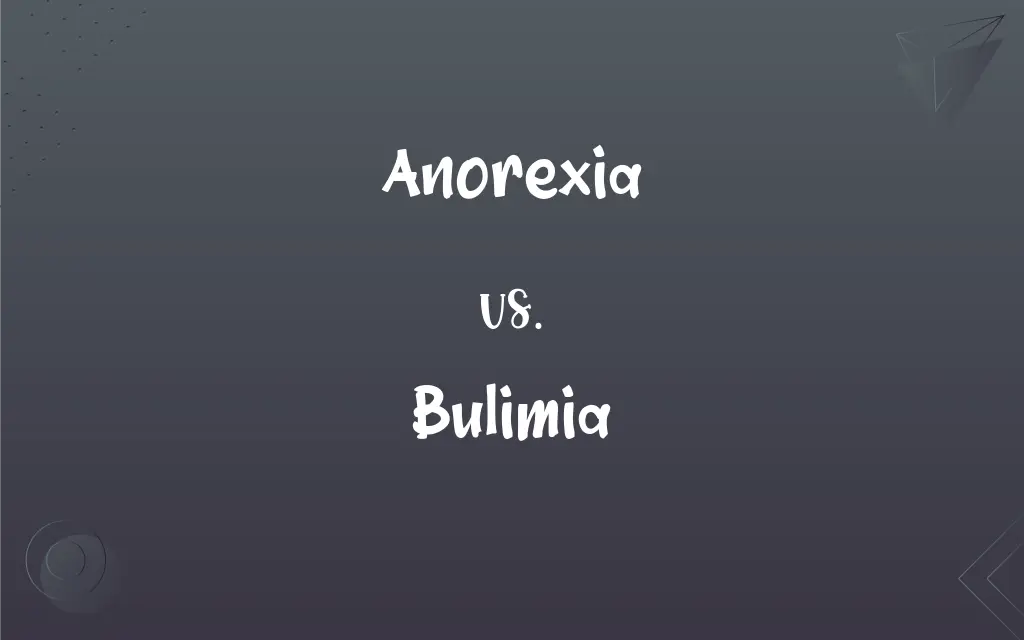Anorexia vs. Bulimia: What's the Difference?
Edited by Aimie Carlson || By Janet White || Published on March 22, 2024
Anorexia is an eating disorder characterized by weight loss and a fear of gaining weight, while bulimia involves binge eating followed by purging.

Key Differences
Anorexia nervosa, commonly referred to as anorexia, is an eating disorder characterized by an intense fear of gaining weight and a distorted body image, leading individuals to restrict their calorie intake severely. This condition can result in significant weight loss and malnutrition. Bulimia nervosa, or bulimia, is another eating disorder that is marked by episodes of binge eating followed by compensatory behaviors, such as self-induced vomiting, excessive exercise, or the use of laxatives, to prevent weight gain.
Both anorexia and bulimia revolve around a preoccupation with body image and weight control, the approaches to managing weight differ significantly between the two disorders. Anorexia is primarily associated with extreme food restriction, while bulimia is characterized by a cycle of bingeing and compensatory behaviors. Both disorders involve significant emotional distress and an unhealthy focus on weight and body shape, but the physical health consequences and behaviors exhibited can vary.
Anorexia can lead to severe health issues due to malnutrition, including osteoporosis, infertility, and heart problems, among others. The restriction of calories affects the body's ability to function properly. Bulimia's health risks include electrolyte imbalances, gastrointestinal problems, and dental issues due to repeated vomiting. Both disorders require professional treatment, including nutrition counseling, therapy, and sometimes medication.
Understanding the differences between anorexia and bulimia is crucial for the effective treatment and support of those suffering from these eating disorders. Both conditions are serious mental health disorders that require a comprehensive treatment approach to address both the physical and psychological components. The emphasis on weight and body image in society contributes to the prevalence of these disorders, highlighting the need for increased awareness and understanding.
Comparison Chart
Main Behavior
Extreme restriction of food intake
Binge eating followed by purging
ADVERTISEMENT
Weight Appearance
Often underweight
Typically normal weight or overweight
Perception of Eating
Fear of gaining weight, avoids eating
Eats large amounts secretly, then purges
Health Risks
Malnutrition, osteoporosis, heart issues
Electrolyte imbalance, dental erosion, gastrointestinal problems
Psychological Aspect
Distorted body image, denial of low weight
Guilt, shame after bingeing, more likely to recognize problem
Anorexia and Bulimia Definitions
Anorexia
Anorexia is a disorder characterized by an obsessive fear of gaining weight, leading to severe food restriction.
Despite being underweight, she views herself as overweight, a common symptom of anorexia.
ADVERTISEMENT
Bulimia
Bulimia is characterized by episodes of binge eating followed by purging to prevent weight gain.
After binge eating, she uses purging as a coping mechanism for her bulimia.
Anorexia
Anorexia can result in extreme weight loss and malnutrition.
Her anorexia has resulted in dangerous malnutrition and hospitalization.
Bulimia
Bulimia's purge behaviors include vomiting, fasting, or excessive exercise after eating.
He exercises for hours to compensate for binge eating, a cycle driven by bulimia.
Anorexia
Anorexia often coexists with a compulsion for excessive exercise to lose weight.
Despite her frail condition from anorexia, she insists on running daily.
Bulimia
Bulimia is a mental health disorder with a focus on body image and an unhealthy relationship with food.
Bulimia makes him obsess over his appearance and fear eating in public.
Anorexia
Anorexia involves a distorted self-perception that contributes to refusal to eat sufficient food.
He hides food instead of eating it, a behavior driven by his anorexia.
Bulimia
Bulimia involves feelings of loss of control during bingeing, followed by extreme guilt.
She feels powerless to stop eating during a binge, a hallmark of her bulimia.
Anorexia
Anorexia is not just about food; it's a complex mental health issue involving body image and control.
Anorexia controls his life, dictating not just his diet but his self-esteem.
Bulimia
An eating disorder characterized by episodic binge eating followed by feelings of shame, depression, and self-condemnation. It occurs chiefly in young women of normal and near-normal weight and is often associated with measures taken to prevent weight gain, such as self-induced vomiting, fasting, or using laxatives. Also called bulimarexia, bulimia nervosa.
Anorexia
Loss of appetite, especially as a result of disease.
Bulimia
Excessive or insatiable appetite.
Anorexia
Anorexia nervosa.
Bulimia
(pathology) A chronic eating disorder characterized by a binge-and-purge cycle - extreme overeating followed by self-induced vomiting.
Anorexia
Loss of appetite, especially as a result of disease.
Bulimia
A disease in which there is a perpetual and insatiable appetite for food; a diseased and voracious appetite.
Anorexia
Anorexia nervosa.
Bulimia
A disordered eating habit characterized by occasional episodes of excessive eating, followed by self-induced vomiting or abuse of laxatives, to avoid gaining weight; it is often accompanied by feelings of guilt; - called also bulimia nervosa and binge-purge syndrome. It is observed mainly in young women of normal weight.
Anorexia
Want of appetite, without a loathing of food.
Bulimia
A disorder of eating seen among young women who go on eating binges and then feel guilt and depression and self-condemnation
Anorexia
A prolonged disorder of eating due to loss of appetite
Bulimia
Pathologically insatiable hunger (especially when caused by brain lesions)
Bulimia
Bulimia can cause serious health issues, including electrolyte imbalances and dental problems.
Her bulimia has led to dental issues from frequent vomiting.
FAQs
How are anorexia and bulimia treated?
Treatment may include therapy, nutritional counseling, and sometimes medication.
What is anorexia?
A disorder marked by an extreme fear of weight gain and severe food restriction.
What causes anorexia and bulimia?
Causes include a combination of genetic, environmental, and psychological factors.
What is bulimia?
An eating disorder characterized by binge eating followed by purging.
Do anorexia and bulimia only affect teenagers?
No, they can affect individuals of any age, though they often start in the teenage years.
How can I support someone with anorexia or bulimia?
Offer support and understanding, and encourage them to seek professional help.
Can anorexia and bulimia lead to death?
Yes, both disorders can be fatal due to their severe physical health consequences.
Can you have anorexia and bulimia at the same time?
It's possible for individuals to exhibit behaviors characteristic of both disorders.
Are anorexia and bulimia choices?
No, they are serious mental health disorders, not lifestyle choices.
Can men have anorexia or bulimia?
Yes, both disorders affect men and women, although they are more commonly diagnosed in women.
Is recovery from anorexia and bulimia possible?
Yes, with proper treatment, individuals can recover from these eating disorders.
What is the difference between binge eating disorder and bulimia?
Binge eating disorder involves binge eating without the regular use of compensatory measures seen in bulimia.
How do I know if someone has anorexia or bulimia?
Look for signs like extreme weight loss, abnormal eating habits, and excessive concern with body weight.
Is there a genetic component to anorexia and bulimia?
Yes, genetics can play a role in the likelihood of developing these disorders.
Can dieting trigger anorexia or bulimia?
Yes, excessive dieting can sometimes lead to eating disorders.
Are there support groups for anorexia and bulimia?
Yes, there are many support groups and resources available for individuals and families.
Do anorexia and bulimia affect physical health only?
They primarily affect mental health but have severe physical health consequences as well.
Can lifestyle changes cure anorexia or bulimia?
Lifestyle changes are part of treatment but professional help is crucial for recovery.
Can anorexia or bulimia affect pregnancy?
Yes, they can lead to complications in pregnancy and harm both mother and child.
How long does recovery from anorexia and bulimia take?
Recovery varies by individual; it can be a long process requiring ongoing support.
About Author
Written by
Janet WhiteJanet White has been an esteemed writer and blogger for Difference Wiki. Holding a Master's degree in Science and Medical Journalism from the prestigious Boston University, she has consistently demonstrated her expertise and passion for her field. When she's not immersed in her work, Janet relishes her time exercising, delving into a good book, and cherishing moments with friends and family.
Edited by
Aimie CarlsonAimie Carlson, holding a master's degree in English literature, is a fervent English language enthusiast. She lends her writing talents to Difference Wiki, a prominent website that specializes in comparisons, offering readers insightful analyses that both captivate and inform.
































































